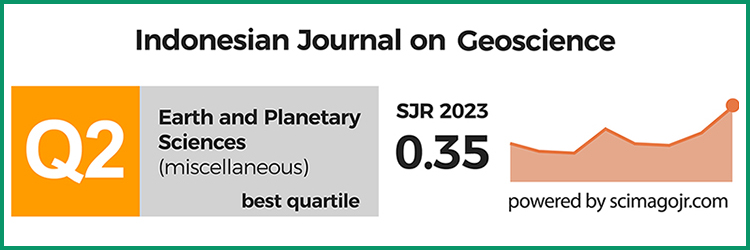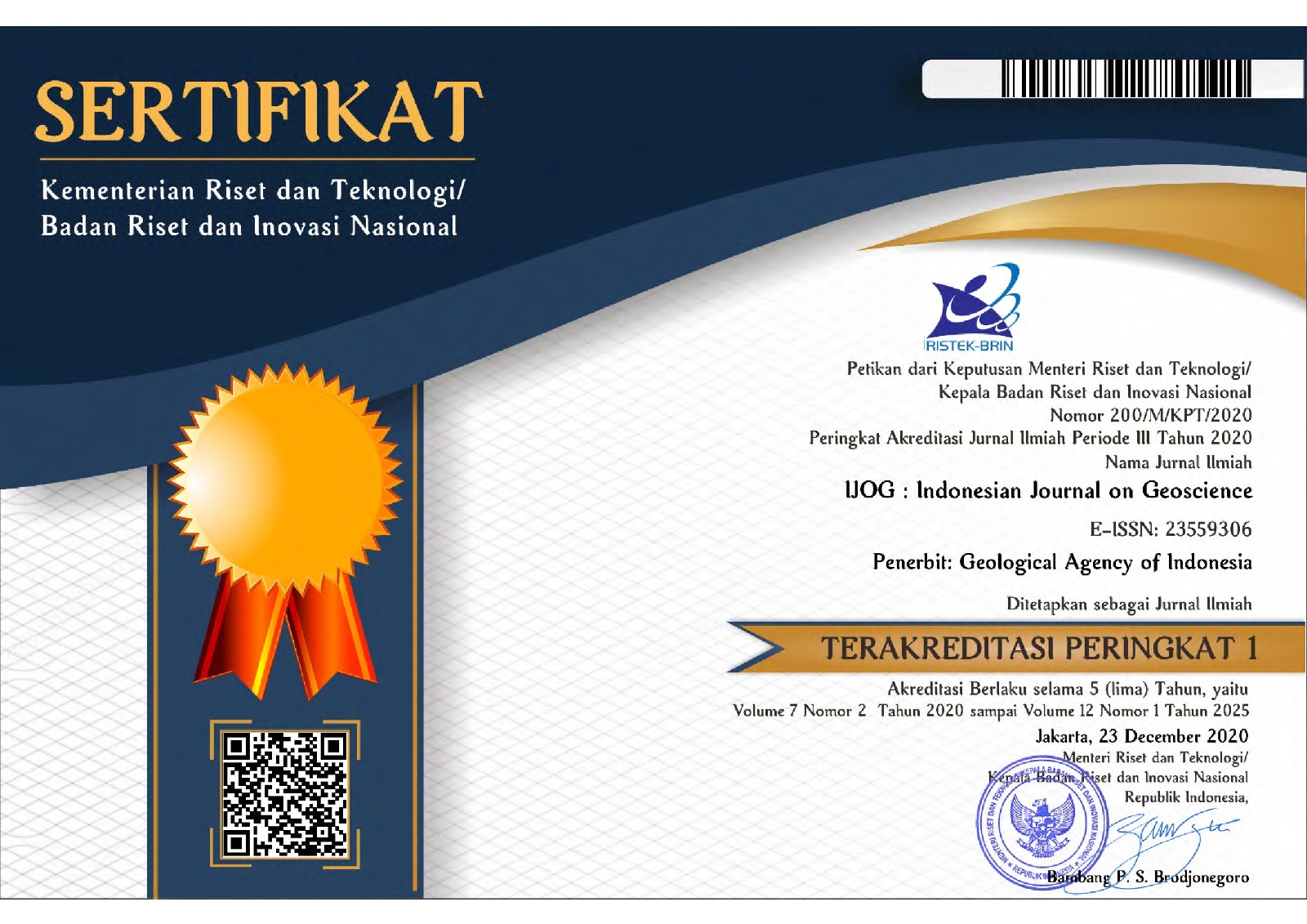Peningkatan kegiatan Gunung Api Tangkubanparahu Jawa Barat pada bulan April 2005
DOI:
https://doi.org/10.17014/ijog.1.4.193-200Keywords:
increasing activity, Tangkubanparahu, geochemistry, geophysics, crater, volcanoquakeAbstract
https://dx.doi.org/10.17014/ijog.vol1no4.20063
Tangkubanparahu is an active strato volcano located in West Java lying about 30 km to the north of Bandung City. Its crest is 2084 m above the sea level. In order to gain a better understanding on volcanism and magmatism of this volcano, various research and monitoring have been carried out, such as geochemistry and geophysics.
Chemical composition of volcanic gases collected from the Ratu Crater (950 C in 1994, 1997, 1998 ratio of CO /H S, CO /H , and H /Ar, is suggested to indicate the presence of a fast fl uid movement and 2005, shows that the gas is hydrous with the main component of H O, CO , H S and small amount SO ; where CO content is higher than (SO + H S). The gas composition showing high of value from the depth before condensed at the shallow surface water area. Hotspring from the Domas Crater contains a high concentration of SO , low of Cl and absence of H CO . The high sulphate content is suggested to be originated from the volcanic gases, especially hydrogen sulphide oxydated near the surface, that then the gas infl uenced chemical composition due to shallow water.
Continuous seismic monitoring uses one permanent station, while the other methods like Electric Distance Measurement (EDM), Global Positioning System (GPS) and Seismometer have been installed temporary. From geophysical evidence on April 2005 activity, some valuable information can be obtained. Hypocenter is located at the depth less than 2 km beneath an area between the Ratu and Domas Craters, while pressure source of deformation is below Domas Crater. Some low frequency volcanoquakes is possibly caused by volcanic gases released from the reservoir.
References
Dana, I. N. dan Patria, C., 2005. Laporan Krisis G. Tangkuban Parahu. Direktorat Vulkanologi. Tidak diterbitkan.
D’Amore, F. and Panichi, C., 1981. Evaluation of deep temperatures of hydrothermal systems by a new gas geothermometer. Geochimica. Cosmochimica, Acta, 44, h. 549-556.
Kadarsetia, E., R., Wahyuningsih, W., dan Suherman, 1977. Penyelidikan Kimia Gas G. Papandayan & G. Tangkubanparahu. Direktorat Vulkanologi. Tidak diterbitkan.
Kusumadinata, K., 1962. Gas racun dan gas lemas di kawah-kawah Tangkubanparahu Direktorat Vulkanologi . Tidak diterbitkan.
Kusumadinata, K., 1979. Data Dasar Gunung api Indonesia. Departemen Pertambangan dan Energi, Direktorat Jenderal Pertambangan Umum. Direktorat Vulkanologi.
Matahelumual, J., 1977. Pengamatan Seismik Gunung Tangkubanparahu. Direktorat Vulkanologi. Tidak diterbitkan.
Nasution, A., Kartadinata, M.N., Kobayashi, T., Siregar, D., Sutaningsih., Hadisantono, R. and Kadarsetia, E., 2004. Geology, Age Dating and Geochemistry of the Tangkubanparahu Geothermal Area, West Java, Indonesia. Journal of Geothermal Resource Society Japan.
Nugraha, J. dan Sriwana, T., 1984. Laporan penelitian analisis kimia gas vulkanik dan kondensat G. Tangkubanparahu. Direktorat Vulkanologi. Tidak diterbitkan.
Rosadi, U., Rochanan, dan Rukada, T., 1998. Laporan pengukuran deformasi leveling G. Tangkubanparahu, Jawa Barat. Direktorat Vulkanologi. Tidak diterbitkan.
Wirakusumah, A.D., 1985. Laporan pemasangan seismograf RTS di G. Tangkubanparahu. Direktorat Vulkanologi. Tidak diterbitkan.



















